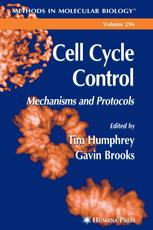

Most ebook files are in PDF format, so you can easily read them using various software such as Foxit Reader or directly on the Google Chrome browser.
Some ebook files are released by publishers in other formats such as .awz, .mobi, .epub, .fb2, etc. You may need to install specific software to read these formats on mobile/PC, such as Calibre.
Please read the tutorial at this link: https://ebookbell.com/faq
We offer FREE conversion to the popular formats you request; however, this may take some time. Therefore, right after payment, please email us, and we will try to provide the service as quickly as possible.
For some exceptional file formats or broken links (if any), please refrain from opening any disputes. Instead, email us first, and we will try to assist within a maximum of 6 hours.
EbookBell Team

4.8
74 reviewsOur understanding of the cell cycle and its regulation has significantly increased with recent discoveries of links to DNA repair, growth, cellular metabolism, development, cell death, proliferative disease, cardiovascular diseases, and cancer. In Cell Cycle Control: Mechanisms and Protocols, internationally recognized researchers not only provide overviews of cell cycle regulatory mechanisms, but also set forth their best techniques for studying the eukaryotic cell cycle and its key regulatory molecules in many major research organisms. Described in step-by-step detail, these readily reproducible methods enable fundamental research on well-defined cell cycle regulators-and those more recently defined-in yeasts, bacteria, plants, Drosophila, Xenopus, and mammals. The protocols follow the successful Methods in Molecular Biology™ series format, each offering step-by-step laboratory instructions, an introduction outlining the principle behind the technique, lists of the necessary equipment and reagents, and tips on troubleshooting and avoiding known pitfalls.
Comprehensive and cutting-edge, Cell Cycle Control: Mechanisms and Protocols offers all cell researchers an indispensable collection of critical reviews and techniques essential to investigate how normal cells divide and how this is altered in disease.